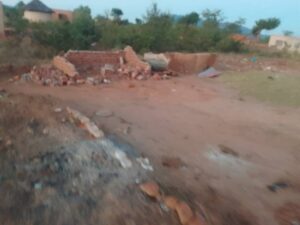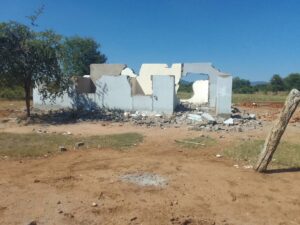Stanley Gutu
Masvingo—Sting evictions sponsored by the government early this year have worsened living conditions for hundreds of people formerly and currently settled on land straddling a huge portion of the Lake Mutirikwi basin in Masvingo.

An estimated 300 households was reported to have settled in the basin by 2017 and, early this year, the government moved in to evict them in a surprise operation that resulted in the arrest of scores of settlers.
With an average rural family in Zimbabwe comprising seven members according to latest census data, this translates to roughly 2 100 people having settled within the basin of one of Zimbabwe’s largest lakes.
The presence of illegally settlers along the basin is blamed for increased deforestation, soil erosion, siltation and eutrophication of the giant water body which is City of Masvingo’s only source of water.
Operation No to Land Barons
On 11 January 2024, the minister of State for Provincial Affairs and Devolution in Masvingo, Ezra Chadzamira, flanked by members of the Joint Operations Command (JOC), launched “Operation Order No to Land Barons” which was also being implemented in other parts of Zimbabwe.
At the launch, he said some 13,000 people were illegally settled in the seven districts making up the province.
The operation was to run for one month from January 10, 2024 to February 9, 2024 but continued for weeks after.
People were forced to demolish their own houses, and areas along the road to the Lake Mutirikwi dam wall became flashpoints of what was later to become a national wave of evictions and attempted evictions.


Counting the losses
While many devastated families left, others survived by playing desperate hide-and-seek with the police, leaving their homes early in the morning and returning late at night.
The evictions were stopped in February this year as senior government and Zanu PF officials claimed that the sting operation had been hijacked by a “third force”.
An investigation by this publication has established that most of the settlers have lived on the basin since 2000 when the fast track land redistribution programme began.
The government of the late Robert Mugabe forced out more than 5,000 white commercial farmers and reallocated the huge plots to political elites—who got prime land—and around 400,000 blacks who received smaller farms mostly in unyielding areas.
Some of the affected families have lived on the basin since the early 1980s when the country had just won its independence from white minority rule.
Others, with the assistance of surrounding village heads and ruling Zanu PF party functionaries, began to filter in from 2010.
With the operation now halted, hundreds of settlers on Lake Mutirikwi basin still remain on the disputed plots.
“I feel like a prisoner”
Others, however, are now rural tenants on small plots not far away from the lake.
“I feel like a prisoner because I have no freedom. The police razed down my home and I no longer have land to till. There are close over 20 families that have relocated here and are in a similar predicament,” said Taonga Makasi, who now lives close to a business centre after being evicted from a place called Manyama.
With his wife and three children, they share two dilapidated rooms that they secured with the help of friends.
Two of children have, however, managed to enrol for their secondary education at Chirichoga High School in Nemanwa while the youngest goes to Sikato Primary School.
But that has brought disruptions to their social life as they were forced to adjust to the new environment away from their land of birth.
This reporter traced other victims that have relocated to Chivi where they secured pieces of land to settle under Headman Madyangove in the dry and rocky Mandamabwe area, about 100km away.
“A cousin agreed to divide his field so that we could have space to build a new home but we are traumatised. The children stopped going to school and we could not salvage all our property from the confusion so we lost a lot,” said a mother of two children who spoke on condition of anonymity.
She said her panicky family sold its seven herd cattle for $50 each when the operation started.
Village cattle sell for an average US$400 in that part of the country.
Those that survived the evictions and remain on the Lake Mutirikwi basin say they suffered severe anxiety.

“The government has shown its capability to act suddenly and without providing dignified alternatives. It’s likely that our victory (the stoppage to the evictions) could be short-lived,” said James Mazviona of Zero Farm.
His relief was a result of intervention by the Zimbabwe Lawyers for Human Rights (ZLHR), which on 23 January successfully secured the release on bail of 66 arrested villagers.
The ZLHR said in a subsequent statement that the affected villagers had lived on the banks of Lake Mutirikwi for more than 20 years.
Settling within a dam basin is prohibited under Section 50(20) of the Water Act.
Before they were freed by magistrate Farai Gwitima on February 22, the charges had been altered to illegally occupying gazetted land as defined in Section 3(1) of the Gazetted Land (Consequential Provisions) Act.
Prosecutors, however, failed to prove the existence of a government gazette entitling the government to ownership of the pieces of land settled by the villagers.
Frank Chirairo, a human rights lawyer who represented the villagers, expressed fear that government may have retreated temporarily to prepare for a vengeful comeback.
Anxious
“It would not be surprising if government amends the law and comes back to remove those very same people who have won their case in court,” said Chirairo.
Chikutuva village head, Henry Makusha whose village sits on Zero Farm, was one of the people arrested in February for illegally occupying ‘gazetted’ state land.
Together with 27 other villagers he leads, Makusha was released after securing the services of a lawyer, Maddock Chivasa.
When contacted for comment, Makusha insisted that Zero Farm was not gazetted state land as evidenced by prosecutors’ failure to prove their claims in court.
“They failed to prove that Zero Farm is gazetted land. We have lived here since 1980, and for them to say we are illegal settlers is a lie. We have now sought an order to bar them from further harassing us,” said Makusha.
He said villagers were fearful that government could hit back by fraudulently producing a backdated notice of gazette.
“This is our ancestral land given to us by our fathers and their fathers before them. I have helped settle some people because that has always been the norm in customary land allocation based on kinship,” said Makusha.
He defended the rights of the settlers to remain on their land, citing land allocation powers given to traditional leaders by the Zimbabwean laws.
Section 26 (2) of the Traditional Leaders Act gives village heads, headmen and chiefs to power to allocate land but in accordance with the Communal Land Act.
Three other evictees, Pondiwa and Simbarashe Charumbira as well as Ezekiel Mazani of Village 31B, Avonmore Farm, told magistrate Tariro Mudzingo on January 19 that they considered their stay on the land legal because they had always paid their rates and taxes to Masvingo Rural District Council since 1997 when they moved onto the land.
Tranos Manjiva, who is Chief Nemamwa, said people who settled on land that government now claimed to be gazetted state land were blameless because they were settled ‘regularly’ by traditional leaders.
“We have traditional boundaries and we operate within those boundaries. If you are a father and your son gets married, you are obliged to give him his space to start his own family. As the families grow, so does the demand for land,” said Manjiva.
Traditional leaders
He said traditional leaders in the area had no maps that delineate the limits of communal lands from state land.
“We have been giving land to our people since the beginning of time, and when the eviction operation began, we were shocked,” Manjiva said, dismissing allegations that traditional leaders like him were corruptly selling land to non-locals.
Davis Marapira, the member of parliament for Zaka Central in Masvingo North refused to comment and directed questions to Chadzamira’s office.
Masvingo North covers parts of the Lake Mutirikwi Basin.
When contacted for comment, the permanent secretary for Masvingo Provincial Affairs and Devolution, Admore Pazvakavambwa, also refused to provide any details on the current state of settlements on the Lake Mutirikwi basin.
NewsHub established that most of the settlers were still on their land but they were no longer sure of their future.
Another government official who declined to be named said official plans regarding the settlers on Lake Mutirikwi were being kept under wraps.
“We are all escaping responsibility because we have realised the high political risk premium involved. There is an unofficial but effective gag order against speaking about the issue especially to the media. There is palpable fear in the offices. If the president never said anything about it, who are you then to say something?” said the official.
This fear and de facto gag order became apparent in the course of the investigations as all attempts to seek official voices were met with refusals to talk.
However, Mutirikwi sub-catchment area manager, Taruvinga Chivasa, said they have repeatedly raised the issue of illegal settlements along the Lake Mutirikwi catchment area and have shared their recommendations with the government.
“Our job is to simply manage the catchment area and in the case of illegal settlements, we have raised the issue with the relevant authorities but nothing has been done.
“We do not have the jurisdiction to move people and those on the basin are causing massive siltation which may not be visible in the immediate but in the long run the impact will be felt,” said Chivasa.
Gagged
The Environmental Management Agency (EMA) Masvingo provincial head, Milton Muusha, skirted repeated efforts to obtain his comment.
When asked to respond to accusations that Zanu PF had ignored, and in some cases actively facilitated the swell of illegal settlers on the basin for political gain, the party’s Masvingo provincial chairperson Robson Mavhenyengwa steadfastly refused to comment, directing all questions to government offices.
“The evictions were government business and I am not in a position to comment on that matter. Redirect your questions to Chadzamira,” said Mavhenyengwa.
In turn, a hesitant Chadzamira, who himself served as Zanu PF provincial chairperson between 2016 and 2022, said the government’s position was to regularise everyone through the local lands office.
“The people who settled themselves and those who were settled illegally need to regularise themselves. The process is ongoing and the ministry of Lands is doing that at the local office,” said Chadzamira.
Asked what support was being given to those that lost their homes, Chadzamira claimed the settlers had already returned to their original homes but could not provide statistics.


Comments are closed.